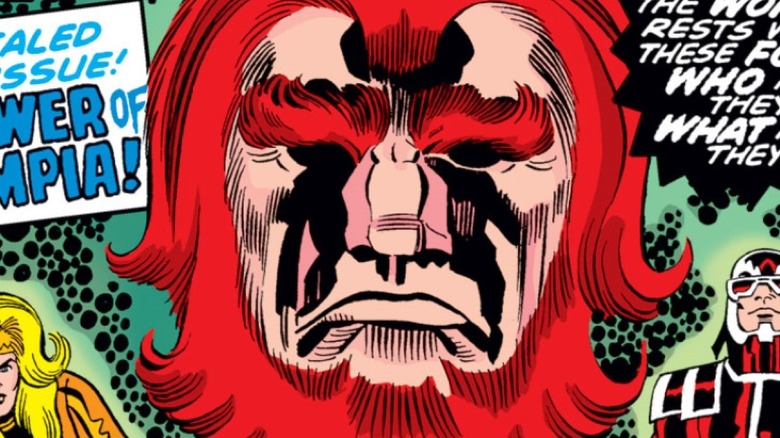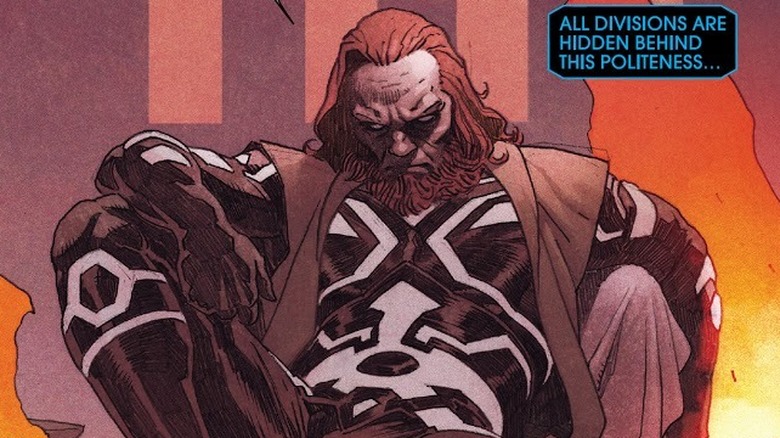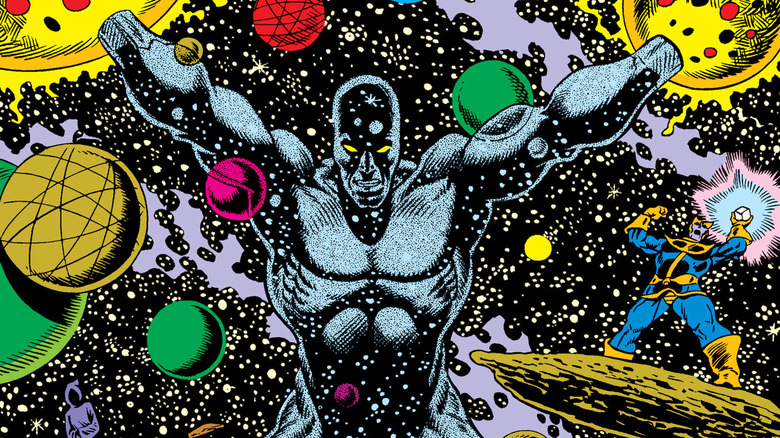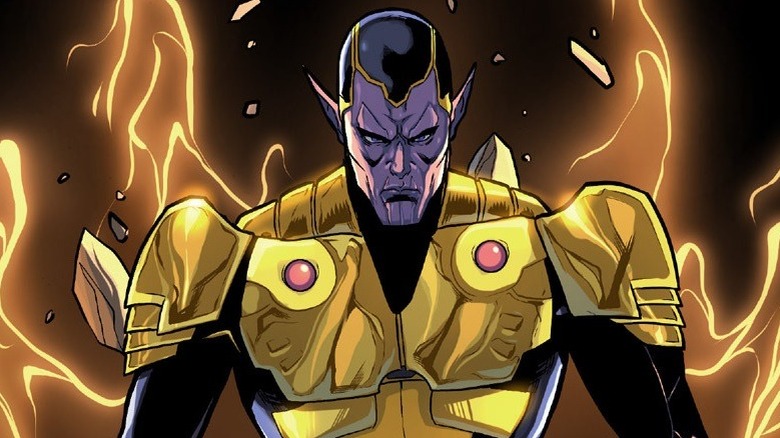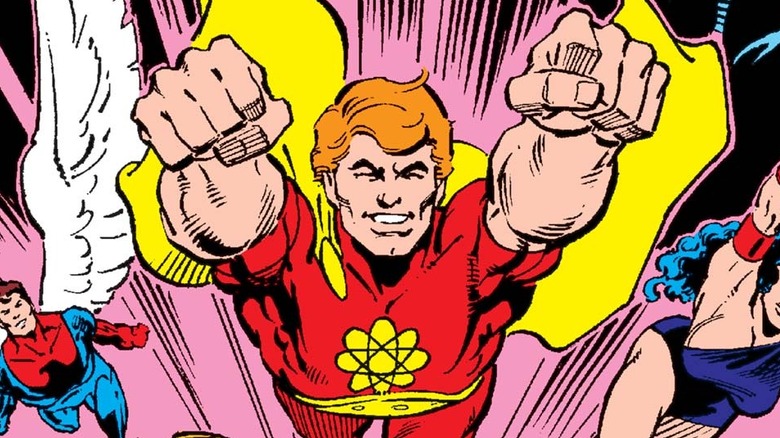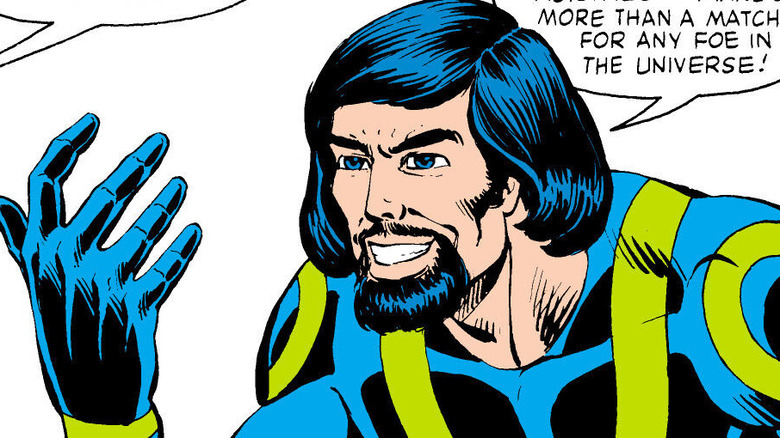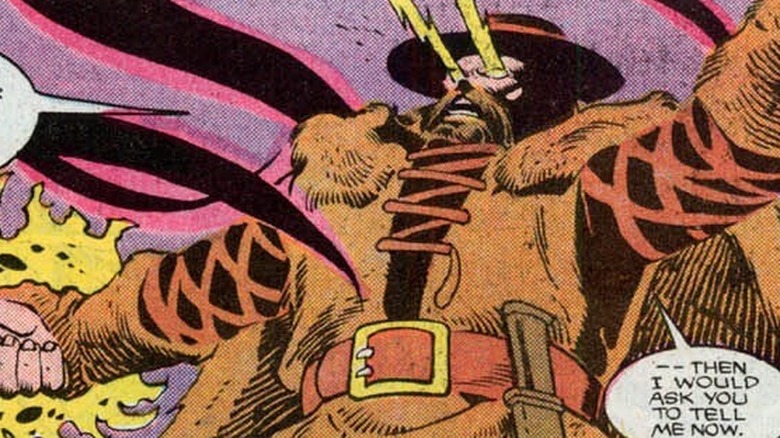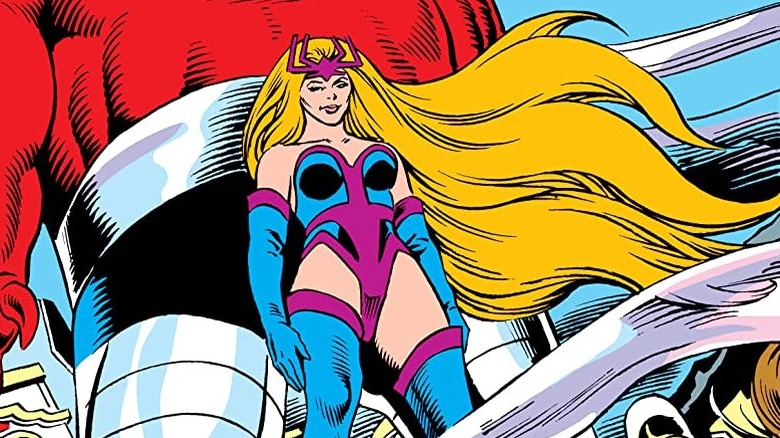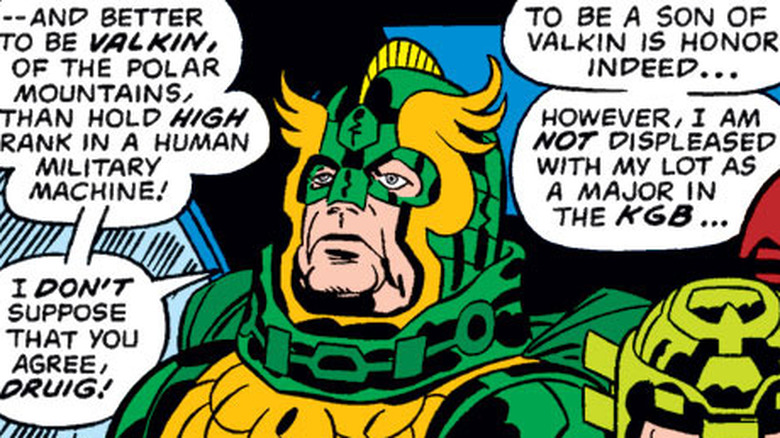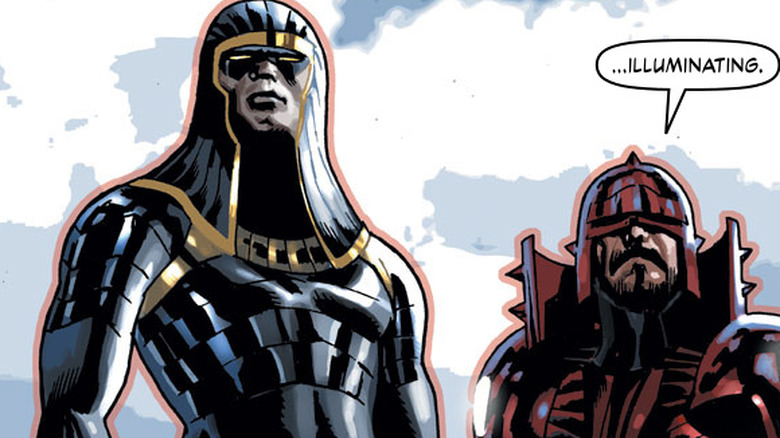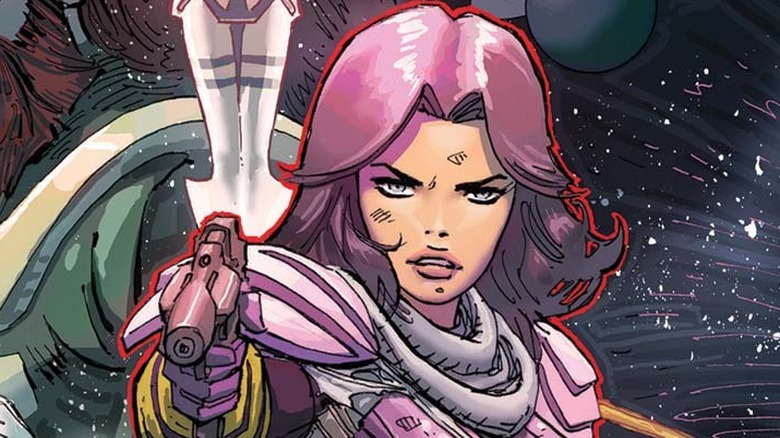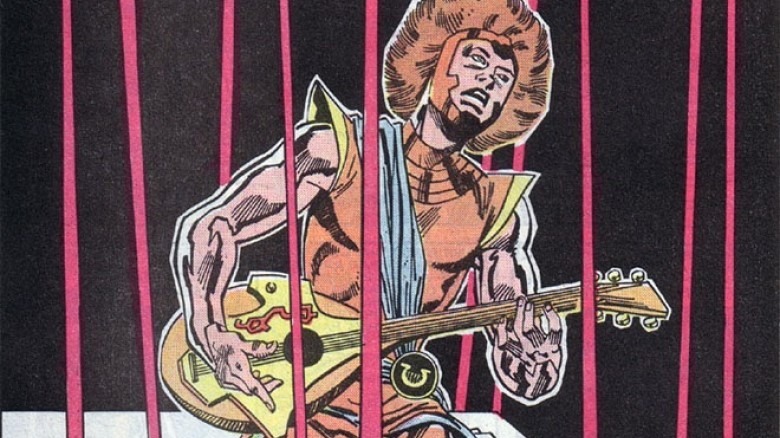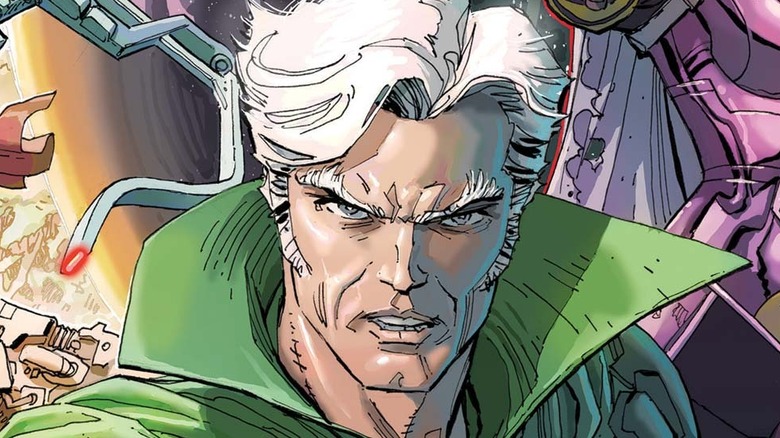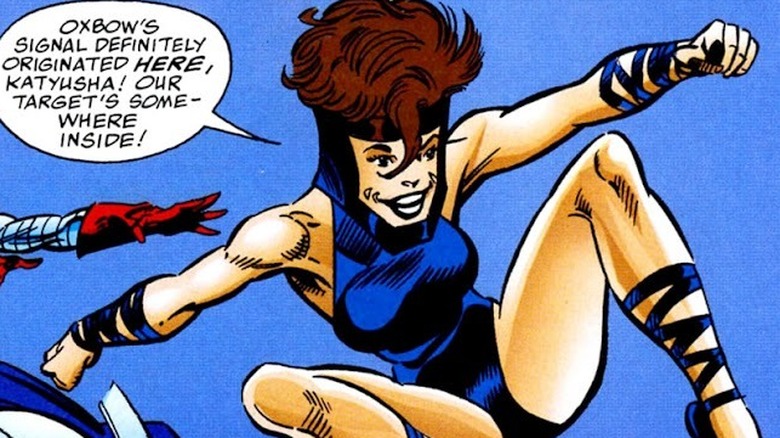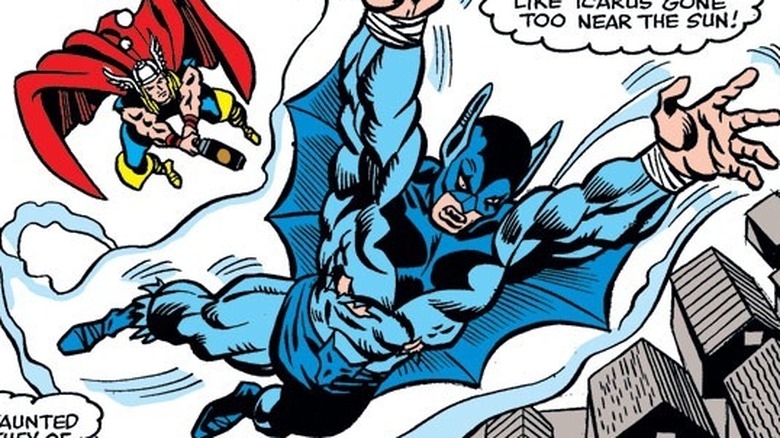Marvel Eternals You Won't See In The Eternals Movie
The Marvel Cinematic Universe gets it biggest expansion yet with the release of "Eternals." Directed by Academy Award-winner Chloe Zhao ("Nomadland"), "Eternals" introduces a brand new pantheon of superheroes into the MCU, including Ikaris (Richard Madden), Sersei (Gemma Chan), Ajak (Salma Hayek), and Thena (Angelina Jolie). A race of extraordinarily long-lived and invulnerable beings, the Eternals were created by the Celestials to protect the world from the unpredictable, unearthly Deviants.
One of the biggest challenges facing "Eternals" is the size of its cast — ten new heroes are about to make their big-screen debut. If the success of "Guardians of the Galaxy" is anything to go by, Ikaris and Sersei will soon be household names alongside formerly obscure heroes like Rocket Raccoon and Groot. Still, as large as this cast is, it represents only a fraction of the Eternals who have appeared in the Marvel Universe. Over one hundred Eternals exist in the comics, with their own factions, cities, and elaborate histories. How does a new fan to the series tell Soule the Charred from The Silvered Bride of Heaven?
Here are notable (and sequel-ready) Eternals you won't see in the "Eternals" movie.
Zuras
Created by legendary artist Jack Kirby, Zuras first appears in "The Eternals" #5 (1976) as Thena's father and the ruler of Olympia. Zuras is the Prime Eternal, with the ability to initiate the rite of the Uni-Mind, in which all of the Eternals combine their wills to create a powerful, singular consciousness. Zuras bears a striking similarity to the Greek god Zeus in stature as well as his name; the Eternals' resemblance to the gods created confusion among ancient civilizations on Earth, sparking a war between the two cosmic forces.
Despite his immense power, Zuras is not invulnerable. He died while trying to save Earth from the judgment of the Celestials, with Thena assuming the role of Prime Eternal. While his body lay in the Eternals' Reactivation Chamber, Zuras' ability to create a Uni-Mind was manipulated by Sprite to channel the power of the Dreaming Celestial and transform the Eternals into human beings. The 2006 "Eternals" series by Neil Gaiman and John Romita Jr. depicts the event and its aftermath. Zuras lived as a vagrant in Manhattan; upon reawakening, he killed Sprite and excluded her from resurrection until the Uni-Mind decided on her return. Zuras' murder at the hands of his nephew Thanos is also the dramatic beginning of the 2021 "Eternals" comic book series by Kieron Gillen and Esad Ribić. Given his tendency to die on the job, it may not be surprising that Salma Hayek's Ajak has taken over leadership of the Eternals in the MCU.
Kronos
Kronos is more than an Eternal — he is one of the most mysterious and powerful beings in the Marvel Universe. Created by Jim Starlin, Kronos first appeared in "Iron Man" #55 (1972) alongside his son Mentor and his grandson Thanos. The first leader of the Eternals and a brilliant scientist, Kronos believed that his people should use their powers to protect Earth, even as his brother Uranos sought to subjugate it. Their dispute erupted into civil war, and the victorious Kronos exiled the Uranite faction from Earth.
500 thousand years ago, Kronos experimented with cosmic energy, triggering an apocalyptic explosion in the Eternal city of Titanos as seen in "What If?" #24 (1980). Though his physical body was destroyed, Kronos no longer needed it; his consciousness had ascended to a higher plane of existence, infused with godlike power. Kronos' ascension gave the Eternals' their immortality as well as the ability to form the Uni-Mind. Despite this legacy, the Eternal Society condemned him for the crime of "auto-deification."
A cosmic entity, Kronos watched over his son A'Lars as he sought to expand the Eternals line with biological children. He gave A'Lars and his wife the powerful Quantum Bands so that they could conceive, predicting that their child would be a boy. That boy grew up to be Thanos, and A'Lars appealed to his "Father of Fathers" to stop his reign of terror. Kronos then resurrected one of Thanos' victims, the human Arthur Douglas, as the revenge-seeking warrior Drax the Destroyer.
Thane
Sporting a uniquely cosmic lineage, Thane is the son of Thanos and an Inhuman woman. The MCU put the spotlight on adopted siblings Gamora and Nebula and emphasized their complicated relationships with their father, but Thane and his family trauma has yet to be explored on the screen. Thane is the Mad Titan's last surviving biological child — as part of his courtship with Death, Thanos swore to slay all of the children he had fathered across the universe.
In 2013's "Infinity" miniseries, Black Bolt, king of the Inhumans, uncovered Thane's existence and released a Terrigen Bomb that awakened his latent powers. To his horror, Thane shared his father's proclivity for violence: while his right hand could now encase objects in amber constructs, his left hand had a deadly touch that could kill anyone in his immediate radius. Thane sought to be a better man than his father, but struggled under the psychic weight of two huge power-ups: he submitted to the Black Vortex, which enhanced his abilities to cosmic levels, and he became host to the universally-feared Phoenix Force. Under the thrall of Death, Thane wanted to kill his father once and for all. The ensuing battle in "Thanos" vol. 2 #12 (2017) destroyed an entire planet, and Thanos emerged victorious. Thane could have been the ruler of the galaxy, but instead he was stripped of his power and condemned to an interdimensional abyss known as the God Quarry.
Hyperion (Earth-712)
All of the Eternals listed so far are mainstays of the mainstream Marvel Universe, designated in the multiverse as Earth-616. Many Hyperions have been introduced in the comics (and have even battled each other), but the most notable one hails from Earth-712. A pastiche of Superman, Hyperion is the sole surviving Eternal in his universe, the last outpost of his dying civilization rocketing him to Earth as a baby. Named "Mark Milton" by his human foster parents, Hyperion grew up with the powers of an Eternal — super strength, flight, invulnerability, and atomic vision.
Hyperion joined the Squadron Supreme (an imitation of the Justice League) and encountered the Earth-616 Avengers in multiple inter-dimensional adventures. The classic 1985 "Squadron Supreme" maxiseries chronicled what happened when the team decided that the best way to protect their world was to take control of it, instituting the Utopia Program to end all war, crime, and disease. Hyperion's teammate Nighthawk disagreed with the Utopia Program's methods (including a behavior modification device), and he died convincing Hyperion that the Project was too corruptible to continue. After dissolving both the program and the Squadron Supreme, he encountered Earth-616's Makkari and learned the truth about his Eternal heritage. Hyperion met his end in "Squadron Supreme" vol. 4 #9 (2016). A cataclysmic incursion between two realities destroyed Earth-712; once again, Hyperion survived the destruction of his civilization, if only just long enough to save his lover and teammate Power Princess by sending her through an interdimensional portal.
Uranos
A madman and a despot, Uranos was the cause of the first Eternal civil war. Uranos was present when Kronos established the ancient Eternal city of Titanos in Earth's polar region, but did not share his brother's peaceful aspirations. According to the Great Machine in "Eternals" #1 (2021), Uranos "thought the best way to fulfill the Eternal principles was to scour the Earth of anything but Eternals."
600 thousand years ago, Uranos and his followers waged war on the rest of the Eternals in what was called the Uranite Heresy. The story of the Uranite Heresy was serialized across several issues of "What If" vol. 1 in 1981. Kronos ultimately defeated Uranos in combat, banishing the Uranite faction to a distant planet. During their exile, Uranos discovered a Kree supply outpost and destroyed the Sentry guarding it so that they could use the alien technology to return to Earth. In response, a Kree armada attacked the Uranite ships; the few survivors landed on Saturn's moon, which they named Titan in honor of the fallen Titanos. The colony on Titan collapsed after another civil war (and possibly the evil influence of the Dragon of the Moon), with Uranos among the dead. The Great Machine determined that Uranos' very existence was a mistake, and that upon resurrection he should be permanently quarantined from Eternal Society. The would-be conqueror then became the first Eternal to be imprisoned in the Exclusion for the crime of attempted omni-genocide.
Betilakk the Interloper
Betilakk the Interloper's past has been mostly lost to history, but he is one of the Eternals who lives in the Arctic city of Polaria. He once lived on Titan, where he fought the first of many battles with the evil entity called the Dragon of the Moon. Betilakk's presence on Titan suggests that he was one of the Eternals who followed Uranos into exile or that he once allied with them. Nevertheless, he survived the discord there and returned to Earth, helping King Arthur defeat the Dragon of the Moon in the sixth century.
Betilakk's hermetic existence on Earth was interrupted by a human psychic who had sensed his presence. Recognizing the man's potential, Betilakk mentored him in developing his mental powers, with disastrous results. Calling himself Manslaughter, Betilakk's pupil became a hired killer and used his powers to inflict pain on his victims. The mentally-disturbed Manslaughter captured the Defenders in a misguided attempt to join the team; Betilakk the Interloper lived up to his name and intervened, but he argued in favor of Manslaughter's recruitment. When the Dragon possessed Moondragon in "The New Defenders" #152 (1986), Betilakk and Manslaughter combined their life forces with Valkyrie and Gargoyle to destroy it, though all four were reduced to pillars of dust by the ordeal.
Being an Eternal, Betilakk was inevitably resurrected and returned to Polaria. It was there that he died again in the 2021 "Eternals" series, the victim of a mass slaughter committed by Thanos.
Cybele
Cybele of Times Present is one of the three Gaian Sisters. Along with Daina of Times Past and Tulayn of Times Future, Cybele serves as an advisor for the Eternals, analyzing current events to determine future actions. She is Zuras' wife and Thena's mother, though due to the unique nature of their creation by the Celestials, they are a family unit in a structural, rather than biological, sense.
Despite her proximity to power, Cybele has no desire to rule the Eternals. She prefers to avoid conflict and matters of state — when Thena was temporarily appointed as Prime Eternal in "Eternals" vol. 2 #1, Cybele attended the ceremony only as a hologram. Nor did Cybele intervene when Ikaris later challenged her daughter's authority. Cybele disapproves of Thena's relationships with Deviants, adding to their emotional distance, though she truly wants her daughter to be happy. "The Official Handbook of the Marvel Universe” vol. 2 #3 (1986) reveals that Cybele has a secret hideaway in a Colorado forest that she keeps invisible to human eyes. In the past, her communion with nature has led humans to confuse her with the Earth goddess Gaea.
Valkin
Valkin is one of the Eternals who live in the wintry city of Polaria. To the more sophisticated Eternals from Olympia (such as Sersei), the Polarians are hardy, boorish cousins from the north. Nevertheless, Valkin has important connections to the main "Eternals" cast. He adopted his nephew Ikaris as his own after Ikaris lost his father in a battle with a Deviant-spawned monster — a move that angered Valkin's son, Druig.
In the twentieth century, during the Cold War, Valkin and Druig infiltrated the KGB. "General Vulcanin" promoted diplomacy over war, urging the Kremlin not to attack when a Celestial suddenly appeared in Siberia. (He was proven right in 1977's "Eternals" #11 when the Celestial killed the nuke-happy generals by giving them heart attacks.) Valkin would regret working among the humans, believing that their violent ways had negatively influenced Druig.
In "Avengers" #248 (1984), after the judgment of the Celestials and the death of Zuras, Valkin was part of the Uni-Mind when it decided that Eternal Society had grown too stagnant on Earth and the majority should seek a new destiny in the stars. The appointed leader of the space-bound Eternals had a tender goodbye with Ikaris and admitted that he had honored him more than his son. Valkin's Eternals then departed with the Deviants who had, in a bizarre plot point, been neutralized and transmuted into a giant cube. More recently, Valkin has returned to Polaria as its supreme leader.
Legba
The Eternals have many talents in addition to their cosmic energy-enhanced superpowers. Thena is a warrior, Sprite is an illusionist, and Sersei can transmute matter at a molecular level. Legba is a master manipulator. When Sprite betrayed the Eternals, Legba was reborn in Louisiana as Revered Lester. Once mistaken for a god, Legba now served one. The naturally charismatic Lester was a gifted orator, preaching to the "hellbound," but he abused his authority to seduce a young woman from his church. Reawakened by Druig in "Eternals" vol. 4 #1 (2008), Legba threw his cunning behind the conspirator in his plot to overthrow Zuras, arguing that Druig, for all his machinations, was much more honest about his true nature than Ikaris.
While many Eternals are adventurers at heart, Legba has a more refined palate, consorting with emperors and artists throughout history. As he tells an opponent in "Eternals Annual" #1 (2008), "I have just one interest in this immortal life: Savoring all the wine, women and song that runneth over this beautiful blue marble."
Sui-San
Perhaps the most tragic figure in the saga of the Eternals, Sui-San's grim destiny was to be the mother of Thanos, the destroyer of half of all life in the universe. Described on her tombstone as "The Most Beautiful of Eternals," Sui-San first appeared in "Captain Marvel" #29 (1973). When Uranos triggered a schism among the Eternals, Sui-San followed her lover in joining him, though she did not share the Uranites' despotic views. Exiled from Earth, the Uranites settled on Titan but were torn apart by a deadly civil war. When the dust settled, only Sui-San survived.
Sui-San's solitude ended with the arrival of another Eternal exile, A'Lars. Together, they reestablished the Titan colony and lived in peace for a time, eventually marrying. This union would ultimately doom Sui-San, as Thanos was a monster from the moment of his birth. Sensing his evil, Sui-San tried to kill her newborn and was institutionalized. Years later, as depicted in "Thanos Rising" #2 (2013), Thanos vivisected and murdered Sui-San in an attempt to understand his origins. Death did not end Sui-San's suffering: After being resurrected by the Great Machine, she was imprisoned in the Exclusion to protect the Eternals from her "unsafe lineage." Her final message to A'Lars was a wish that they had never existed.
Khoryphos
The troubadour of the Eternals, Khoryphos is rarely seen without a musical instrument. Khoryphos is a comparatively youthful Eternal and considers himself an artist rather than a warrior. He has dedicated his incredibly long life to the pursuit of music; among his songs are a composition dating back to the time of the Roman emperor Tiberius and an elegy written for Ikaris after the death of his young son. In the 1985 "Eternals" maxiseries, Khoryphos meets a kindred spirit in the Deviant artist Yrdisis, whose brilliant paintings disprove the idea that Deviants are incapable of beauty. Khoryphos chose to stay with Yrdisis for a time, but when Sprite used the power of the Dreaming Celestial to turn the Eternals into amnesiac humans, he lived as "DJ Phosphorus" on Earth. He has since regained his status as an Eternal.
According to "The Official Handbook of the Marvel Universe" vol. 2 #7 (1986), Khoryphos may be the mythological musician Orpheus or, as is often the case with Eternals, been confused with Orpheus while visiting ancient Greece.
A'Lars
The final branch on the Thanos Family Tree is A'Lars. Like his father Kronos, A'Lars was known for his genius, and together with Zuras he formed the first Uni-Mind. While Zuras believed in the perfection of the Great Machine's design for Eternal Society, A'Lars argued that it should be reformed — especially the order that new, true Eternals should not be born. For the second time, a disagreement between brothers splintered Eternal society, causing the Titan Schism.
As part of the accord that ended the war, A'Lars founded a new colony as an experiment. He ventured to Titan in search of Sui-San, believing she would be an ideal partner. The pair repopulated Titan via technological means and, with the aid of Kronos and the Quantum bands, conceived two sons: Thanos and the future Avenger Eros. Thanos turned A'Lars' dream into a nightmare, killing his mother and decimating the Titan colony. Calling himself "Mentor," A'Lars opposed Thanos for the remainder of his life and allied himself with heroes like Captain Marvel. Mentor died at the hands of the son he had desperately wanted, and the Titan experiment was deemed a failure. Reawakened in the Exclusion, A'Lars faced further punishment. In a final "I told you so," Zuras imprisoned him in a cell walled with screens, a pixel lighting up for every person killed by Thanos. The light blinded A'Lars within days. The story of A'Lars and the Titan Schism was told most recently in 2021's "Eternals: Thanos Rising" one-shot.
Pixie
Not to be confused with the pink-haired Pixie of the X-Men, the Eternal called Pixie was part of a "lost generation" of Marvel heroes who protected the world in the decades between World War II and the emergence of the Fantastic Four. Created by John Byrne and Roger Stern, Pixie first appeared in "Marvel: The Lost Generation" #12 (2000), a limited series numbered in reverse order due to its time-traveling plot.
Playful and flirtatious, Pixie hungered for adventure and joined the superhero team known as the First Line. In addition to Pixie's natural powers as an Eternal, she used her "pixie dust" to leave her enemies stoned — that is, literally transformed into stone. Pixie recruited the Canadian superhero Oxbow for the First Line, and their partnership turned romantic. Unfortunately, Pixie lost most of her teammates, including Oxbow, while fighting an invading Skrull fleet. After the demise of the First Line, Pixie returned to the Eternals and fought alongside them against the world-devouring Horde.
Vampiro
A super-strong immortal with a penchant for theatrics and a devoted cult following, the razor-mouthed Vampiro isn't actually a vampire, but an Eternal! Introduced in 1979's "Thor" #290, Vampiro lives among the humans of Los Angeles with his mortal wife, Maria. A popular luchador known for never losing a fight, "El Vampiro" met his match when he was gored by his opponent, the horned Deviant El Toro Rojo. The "Red Bull" didn't give Vampiro wings, but he did fly away for his life. Luckily for the injured Eternal, Thor rescued him before he could fall out of the sky. While Vampiro recuperated at home, Thor took his place in the ring, wrestling El Toro Rojo before ultimately defeating (and dehorning) the Deviant in front of a roaring crowd.
Years later, Vampiro was among the Eternals reawakened and brainwashed by Druig in his ill-fated attempt to overthrow Zuras. Vampiro fought Ikaris and the X-Men in "Eternals" vol. 4 #8 (2009), even clashing with Wolverine in the streets of San Francisco, though both sides joined forces in a fight against the invading alien Horde. With the Eternals now hitting the big screen, will El Vampiro come out of retirement? He's due for a comeback.
